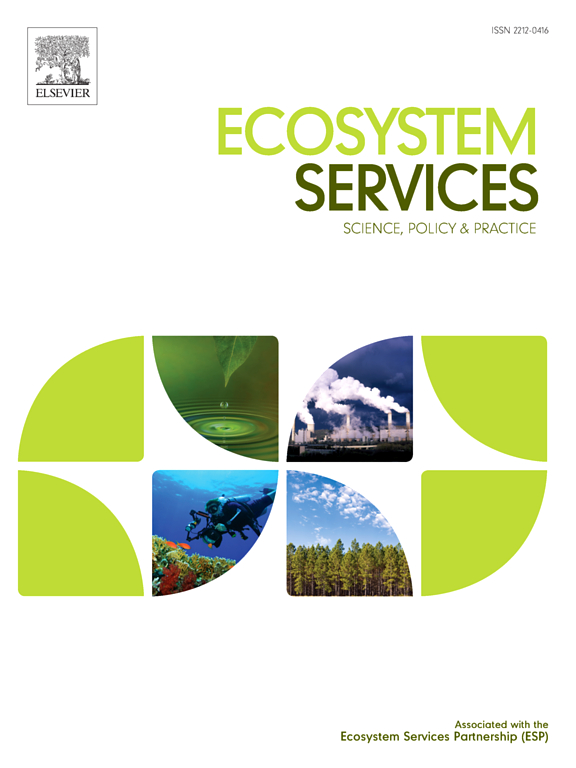Interoperability for ecosystem service assessments: Why, how, who, and for whom?
IF 6.6
2区 环境科学与生态学
Q1 ECOLOGY
引用次数: 0
Abstract
Despite continued, rapid growth in the literature, the fragmentation of information is a major barrier to more timely and credible ecosystem services (ES) assessments. A major reason for this fragmentation is the currently limited state of interoperability of ES data, models, and software. The FAIR Principles, a recent reformulation of long-standing open science goals, highlight the importance of making scientific knowledge Findable, Accessible, Interoperable, and Reusable. Critically, FAIR aims to make science more transparent and transferable by both people and computers. However, it is easier to make data and models findable and accessible through data and code repositories than to achieve interoperability and reusability. Achieving interoperability will require more consistent adherence to current technical best practices and, more critically, to build consensus about and consistently use semantics that can represent ES-relevant phenomena. Building on recent examples from major international initiatives for ES (IPBES, SEEA, GEO BON), we illustrate strategies to address interoperability, discuss their importance, and describe potential gains for individual researchers and practitioners and the field of ES. Although interoperability comes with many challenges, including greater scientific coordination than today’s status quo, it is technically achievable and offers potentially transformative advantages to ES assessments needed to mainstream their use by decision makers. Individuals and organizations active in ES research and practice can play critical roles in creating widespread interoperability and reusability of ES science. A representative community of practice targeting interoperability for ES would help advance these goals.
生态系统服务评估的互操作性:为什么,如何,谁,为谁?
尽管文献持续快速增长,但信息的碎片化是更及时和可信的生态系统服务(ES)评估的主要障碍。造成这种分裂的一个主要原因是目前ES数据、模型和软件的互操作性有限。FAIR原则是对长期开放科学目标的重新表述,强调了使科学知识可查找、可获取、可互操作和可重复使用的重要性。至关重要的是,FAIR的目标是使科学更透明,更容易被人和计算机传递。然而,通过数据和代码存储库查找和访问数据和模型比实现互操作性和可重用性更容易。实现互操作性将需要更一致地遵守当前的技术最佳实践,更关键的是,建立共识并一致地使用可以表示es相关现象的语义。基于最近主要的ES国际倡议(IPBES, SEEA, GEO BON)的例子,我们阐述了解决互操作性的策略,讨论了它们的重要性,并描述了个体研究人员和实践者以及ES领域的潜在收益。尽管互操作性带来了许多挑战,包括比目前的现状更大的科学协调,但它在技术上是可以实现的,并且为决策者主流使用所需的ES评估提供了潜在的变革性优势。积极参与ES研究和实践的个人和组织可以在创建ES科学的广泛互操作性和可重用性方面发挥关键作用。一个针对ES互操作性的有代表性的实践社区将有助于推进这些目标。
本文章由计算机程序翻译,如有差异,请以英文原文为准。
求助全文
约1分钟内获得全文
求助全文
来源期刊

Ecosystem Services
ECOLOGYENVIRONMENTAL SCIENCES&-ENVIRONMENTAL SCIENCES
CiteScore
14.90
自引率
7.90%
发文量
109
期刊介绍:
Ecosystem Services is an international, interdisciplinary journal that is associated with the Ecosystem Services Partnership (ESP). The journal is dedicated to exploring the science, policy, and practice related to ecosystem services, which are the various ways in which ecosystems contribute to human well-being, both directly and indirectly.
Ecosystem Services contributes to the broader goal of ensuring that the benefits of ecosystems are recognized, valued, and sustainably managed for the well-being of current and future generations. The journal serves as a platform for scholars, practitioners, policymakers, and other stakeholders to share their findings and insights, fostering collaboration and innovation in the field of ecosystem services.
 求助内容:
求助内容: 应助结果提醒方式:
应助结果提醒方式:


